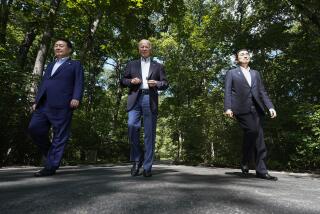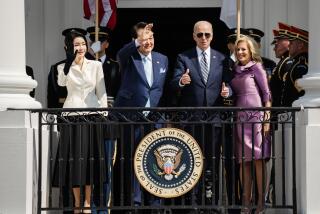U.S. concerned about suspected N. Korea-Myanmar military ties
PHUKET, THAILAND, AND WASHINGTON — Secretary of State Hillary Rodham Clinton expressed concern Tuesday about suspected military ties between North Korea and Myanmar’s ruling generals, saying they had the potential to destabilize the entire region.
Clinton arrived in Thailand and met with Prime Minister Abhisit Vejjajiva before a regional security summit on the island of Phuket.
The secretary of State is expected to sign a nonaggression pact during the meeting of the Assn. of Southeast Asian Nations, or ASEAN. The agreement has been a sticking point for years, with the U.S. drawing criticism from ASEAN members for not signing despite its history and significant military presence in the region.
A statement from ASEAN foreign ministers said that a U.S. decision to sign would be “a strong signal of its commitment to peace and security in the region.”
Clinton arrived in the region just days after a twin suicide bombing of two luxury hotels in Jakarta, Indonesia’s capital. Although no one has claimed responsibility, analysts said the attacks probably were carried out by those associated with Jemaah Islamiah, a group linked to Al Qaeda.
But U.S. officials are bringing along a list of other security issues.
They have voiced growing concern recently over suspected military links between North Korea’s reclusive communist government and the rulers of Myanmar, which is also known as Burma. Some in Washington suspect that the Pyongyang government may be selling Myanmar nuclear weapons systems as well as conventional arms.
In recent weeks, North Korea sent a freighter, the Kang Nam I, with a suspected arms cargo, to Southeast Asia. Myanmar was a suspected destination. The U.S. Navy shadowed the ship, and U.S. officials pressed other countries to deny it entry under a recently passed U.N. Security Council resolution.
Eventually, the vessel turned around and headed home.
Clinton denounced Myanmar authorities for human rights violations, especially those toward young women and girls and demanded fair treatment for dissident Aung San Suu Kyi.
“We know that there are also growing concerns about military cooperation between North Korea and Burma, which we take very seriously,” Clinton said. “It would be destabilizing for the region. It would pose a direct threat to Burma’s neighbors. And it is something, as a treaty ally of Thailand, that we are taking very seriously.”
At the ASEAN meeting, Clinton is expected to urge fellow officials to help enforce the United Nations resolution adopted in response to North Korea’s missile and nuclear tests. It authorizes countries to challenge North Korean ships they believe to be carrying banned goods.
U.S. officials also want ASEAN countries to take part in financial sanctions under the U.N. resolution, aimed at halting transactions underwriting weapons trade, which have proved especially troubling in the past in regard to the North Koreans.
Clinton left the door open to improved relations with Myanmar if it changed its policies. Burmese historian and political analyst Thant Myint-U, grandson of former U.N. Secretary-General U Thant, said that taking the time to review policy and consult regional governments could result in a more effective U.S. approach.
“After two decades of surviving Western condemnation, I think Burma’s generals are fairly numb to outside criticism. New sanctions will only deepen their isolation,” Thant said in an interview.
“People think engagement means caving in. It actually means peeling away the isolation on which the status quo depends and creating new facts on the ground, rather than making speeches from thousands of miles away and hoping for miracles.”
--
McDermid is a special correspondent.
More to Read
Sign up for Essential California
The most important California stories and recommendations in your inbox every morning.
You may occasionally receive promotional content from the Los Angeles Times.











